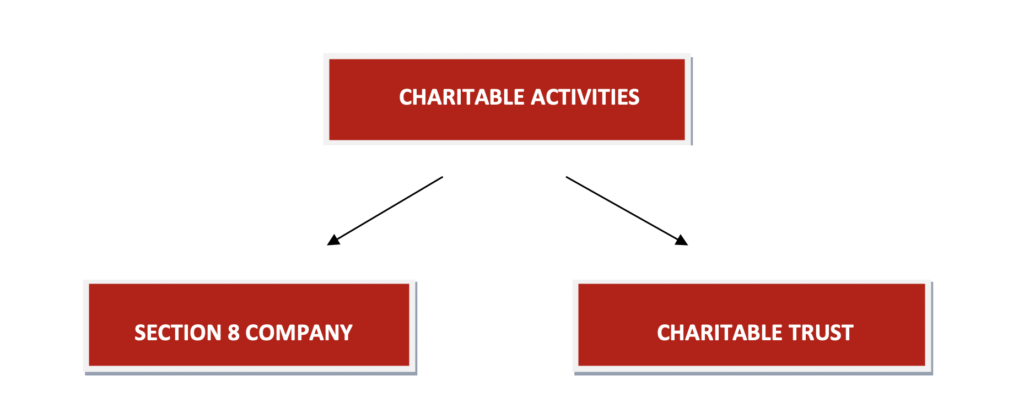Charity begins at home, and home for some people is not just the family, but their society, their state, their country and the world in which they live. It is said that, the person should not be judged by, what he achieves for himself, but by what he achieves for society at large. In the words of Mr. Azim Premji, who is one of the world’s top philanthropists, “You cannot mandate philanthropy. It has to come from within, and when it does, it is deeply satisfying”. Even though Mr. Azim Premji was not in favor of mandating philanthropy by way of law, we never the less have one under, The Companies Act, 2013. So, we can do philanthropic activities either when we feel like doing it or when we are mandated by law to do it. In this brief note we shall guide you as to how one can move forward for carrying out charitable activities, in the best possible structure.
FAQs
1. Which are the major types of charity?
Charity can be done, either when it is mandated by the law or when one feels like doing it i.e. Suo-moto. Each of the types can be understood as under:
- Charity – Suo Moto – We get a lot of things from society and there comes a time, when we feel that we should take a step forward and do something for the society, i.e. people at large. People with similar interest can come together and be a part of organization and achieve the objective that it sets for oneself.
- Charity – Mandated by Law (Corporate Social Responsibility CSR) – As per provisions of Section 135 of the Companies Act, it prescribes 3 conditions and on satisfying any one of the criteria, company is bound to carry out CSR activities:
- Company having net worth of rupees five hundred crore or more, or
- turnover of rupees one thousand crore or more or
- a net profit of rupees five crore or more during any financial year
The Board of every company that satisfies any of the above conditions shall ensure that the company spends, in every financial year, at least two percent of the average net profits of the company made during the three immediately preceding financial years, in pursuance of its Corporate Social Responsibility Policy.
2. What structure can be used for carrying out Charitable Activities?
Whether one decides Suo-moto or is mandated by law to do some charity, he can do so by one of the two ways:

Each of the two options mentioned herein can be understood as under:
CSR ACTIVITIES CONDUCTED THROUGH SECTION 8 COMPANY
Section 8 of the Companies Act 2013, permits a company to register itself as a not- for- profit company with limited liability to its members. Following are the conditions that it must satisfy —
- has in its objects the promotion of commerce, art, science, sports, education, research, social welfare, religion, charity, protection of environment or any such other object;
- intends to apply its profits, if any, or other income in promoting its objects;
- intends to prohibit the payment of any dividend to its members
CSR ACTIVITIES THROUGH CHARITABLE TRUST
A trust can be formed by a founder along with other trustees. A trust deed is to be drafted and duly registered with the registrar of trusts. Since, power to regulate trusts are covered in List – III of Seventh Schedule of the constitution of India, state and centre can both enact laws. In the state of Maharashtra, Maharashtra Public Trust Act, 1950 (Formerly known as Bombay Public Trust Act) applies to public trusts.
To form a charitable trust, it is very important that the objects of the trust must be for greater good of public at large. Charitable purpose includes:
- Education
- Medical relief
- Relief of power by or distress
- the advancement of any other object of general public utility
Governance of a trust is the responsibility of the trustees. Legal ownership of trust property vests in the trustees.
3. What is the process of formation of above entities?
INCORPORATION OF SECTION 8 COMPANY
- The Company has to first decide the Charitable Object that it intends to achieve; it can either be one or more.
- The Company has to decide on the Share Capital with which it will start the Company and the subscribers to such share capital.
- The no. of Directors that will be appointed in the said Company.
- Application is required to be filed to Central Government for grant of License.
- Other formalities with respect to incorporation are similar to that of any other company which would be incorporated under Companies Act, 2013.
INCORPORATION OF CHARITABLE TRUST
- Trust Deed is the charter document, through which Trust communicates its objects.
- Identifying the author of the Trust and Trustees who shall run the Trust along with their consent letter.
- Registration with the Charity Commissioner.
4. What are the advantages with respect to the structure mentioned above?
ADVANTAGES OF SECTION 8 COMPANY ARE AS UNDER
- No requirement of minimum paid-up share capital.
- Section 149(1) relates to minimum and maximum number of directors. A minimum of three directors in case of public company and two directors in case of private company. This section shall not apply to section 8 Company.
- No Specific compliance with respect to appointment of Independent Directors.
- It shall hold at least one meeting within every six calendar months.
- The bar on taking up directorship in more than twenty companies has been relaxed in the case of section 8 companies. Therefore, an individual, if he is eligible, can be a director in more than 20 section 8 companies. This restriction however continues to stay for other categories of companies.
- There is also relaxation with respect to Quorum required for conduct of meeting. Wherein minimum of two members are required.
ADVANTAGES OF CHARITABLE TRUST
- Registration of trust as compared to section 8 company requires less time for incorporation and is easier as regards to compliance.
- Trustees has complete control over the trust.
- There is no statutory requirement to hold specified number of meetings.
- Documentation, filing of returns and other statutory compliances in comparison to that of section 8 company are less.
5. How Income Tax Law applies to Structure chosen for carrying out Charitable Activities?
Under Income Tax Act, 1961 there is no difference how trust and section 8 Company is taxed. The taxation of the charitable entity is governed by the chapter III of the income tax which includes section 11, 12, 12A, 12AA/12AB and 13. The Government of India has given various exemptions to charitable and religious trust keeping in view the services they render to the nation. Section 11 deals with taxation of the income from the property held for charitable purposes. As per the said section, if the charitable entity spends more than or equal to 85% of its total receipts towards its object in India, then there is no tax on balance 15%. It is worthwhile to note that, the amount spend even for the fixed asset of the trust is also eligible to include in 85%.
For registering the Trust or Company first time as Charitable Organization under Income Tax Act, application has to be before Commissioner of Income Tax (Exemptions) under Form 10A. Commissioner of Income Tax (Exemption), should be satisfied that objects of the trust are charitable in nature, they are not for personal benefits of trustees or directors, an entity has the vision and the same should be coming out from the report reflecting activities which entity will carry out. It can also apply for Certificate under 80-G, wherein donations made to such entity will be Tax deductible.
The exemption is now granted under the Income Tax Act for a period of 5 Years and the certificate has to be renewed every 5 years, by making an application before Commissioner of Income Tax – (Exemption).
COMPARATIVE ANALYSIS BETWEEN SECTION 8 COMPANY AND CHARITABLE TRUST
| HEAD | SECTION 8 COMPANY | CHARITABLE TRUST |
| 1. Applicable Law | Companies Act 2013 | Maharashtra Public Trust, Act 1950 |
| 2. Time Required for Incorporation | 15-20 days | 8-15 days |
| 3. Registering Authority | Registrar of Company | Sub-registrar of Registration/Charity Commissioner |
| 4. Name Approval | Application has to be made to ROC | No such requirement of approval |
| 5. Minimum members/directors | At least 2 Members | At least 2 Trustees |
| 5. Minimum members/directors | At least 2 Members | At least 2 Trustees |
| 6. Governing Structure | General Body of Directors/ Board of Directors | General Body/ Board of Trustees |
| 7. Voting Rights | Voting Rights vary on the basis of the shareholding. | All trustees have equal voting rights. |
| 8. Filing | Company has to submit Annual Audited Accounts and Returns filed by it to the ROC. | No documents are required to be submitted to any Registering Authority. Except submission of Accounts. |
| 9. Meetings | 4 Board meetings and 1 Annual General Meeting have to be carried out in a year. | There is no such provision. |
| 10. Transfer of directorship/membership | Directorship or membership can be transferred. | Trusteeship cannot be transferred. |
| 11. Payment to directors/trustees | General Body of company can approve to get payment. | Trustees cannot receive payment. But if the provision is there in the trust deed than trustees can receive professional fees. |
| 12. Investment by promoters/trustees | No requirement of minimum capital. | No requirement of minimum capital. |
| 13. Liabilities of Directors/trustees | Directors can be held liable for the acts done by them or for their negligence and the onus is on directors to prove that they are innocent. | Trustees can be held liable for the acts done by them or for their negligence and the onus is on charity commissioner to prove that the trustees are guilty. |
How can InCorp help you?
Our team at InCorp can not only help you choose the correct legal structure for carrying out charitable activities, but also assist you in complying with all the applicable laws and framework thereafter. We further ensure that while doing charity, organizations are not stuck in the clutches of various legal hurdles and we make it our responsibility to keep charitable organizations compliant of all laws at all points in time.


